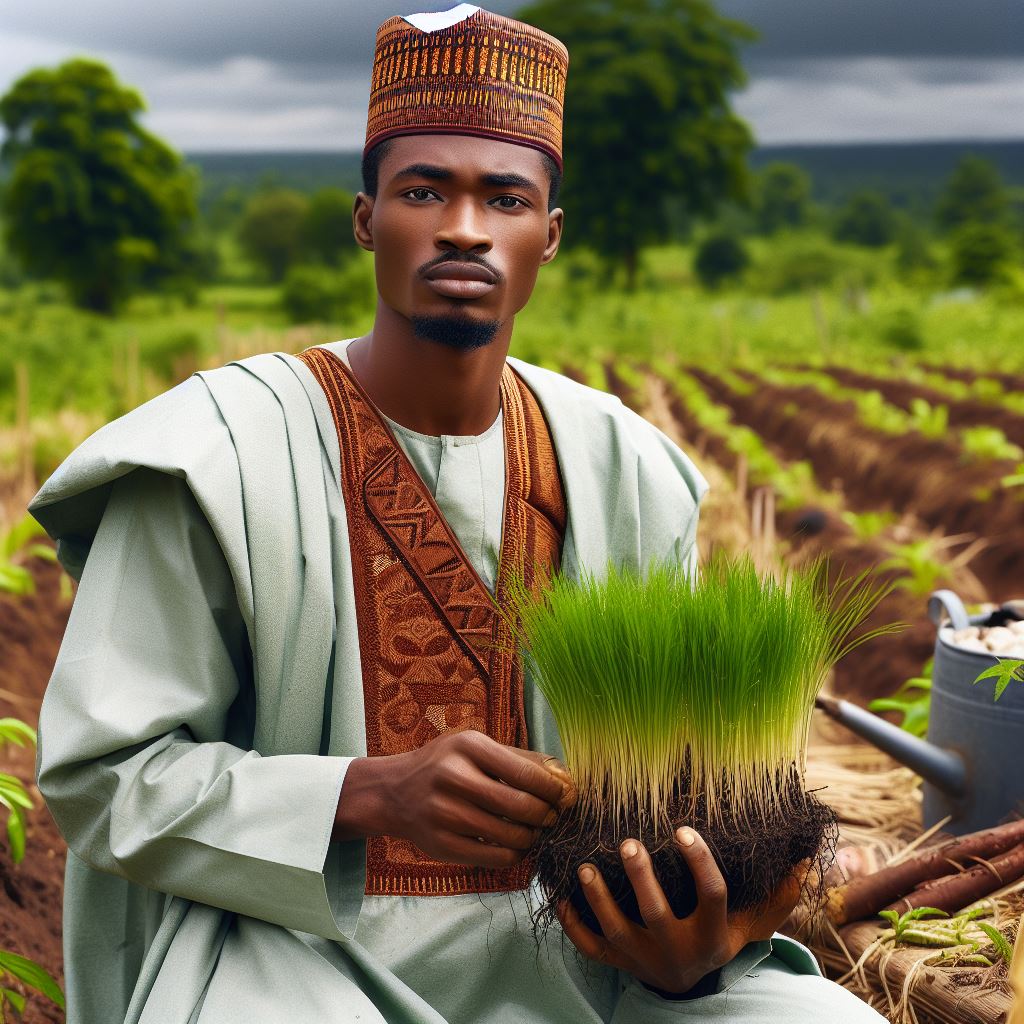Introduction
In this blog post, we will explore Student Experiences Agronomy in Nigerian Campuses.
Nigeria’s campuses, bustling hubs of intellect and culture, are melting pots of diverse perspectives and academic fervor.
Within these institutions, the field of agronomy stands as a cornerstone of agricultural development in Nigeria.
The significance of agronomy in bolstering the country’s agricultural sector cannot be overstated.
Agronomy, the science and practice of soil management and crop production, plays a pivotal role in ensuring food security and sustainable agricultural practices in Nigeria.
Students undertaking agronomy courses delve into a myriad of subjects, from soil science to plant genetics, equipping themselves with the knowledge and skills to revolutionize farming practices.
The purpose of this blog post is to shed light on the unique experiences, challenges, and accomplishments of students navigating the world of agronomy within Nigerian campuses.
From the bustling halls of renowned universities to the tranquil settings of agricultural colleges, students engage in rigorous academic pursuits, practical fieldwork, and research endeavors.
Throughout this section, we’ll uncover firsthand accounts from students, highlighting their motivations for choosing agronomy, the hurdles they face in their educational journey, and the impact they aspire to make in Nigeria’s agricultural landscape.
Their stories reflect resilience, innovation, and a deep-rooted passion for contributing to the nation’s agricultural growth.
Join us on this insightful journey as we explore the trials and triumphs of students pursuing agronomy in Nigerian campuses.
Through their narratives, we gain a glimpse into the dynamic world of agriculture education, where passion meets purpose and knowledge seeds the future of Nigerian farming.
Overview of Agronomy
Definition and scope of agronomy
Agronomy is the science and practice of crop production, including soil management and crop nutrition.
Importance of studying agronomy in Nigerian campuses
Studying agronomy in Nigerian campuses is important because it contributes to food security and economic development.
By studying agronomy, students can pursue careers in agriculture consulting, research, and farm management.
They can also work as agronomists, crop specialists, soil scientists, or agricultural extension officers.
Agronomy is crucial for sustainable farming practices and improving crop yields in Nigeria.
Students studying agronomy learn about crop production techniques, plant genetics, and soil fertility management.
They also gain practical skills in pest management, irrigation systems, and farm machinery operation.
Agronomy students in Nigerian campuses have access to modern laboratories and field experimentation facilities.
They can conduct research on crop breeding, soil testing, and agricultural technology innovation.
Agronomy programs often include internships and industry placements, providing students with hands-on experience.
Potential career opportunities in agronomy
Studying agronomy in Nigerian campuses exposes students to the potential of modern farming practices.
They can learn about precision agriculture, hydroponics, and sustainable soil and water management techniques.
Through coursework and practical experiences, students develop critical thinking and problem-solving skills.
They learn how to analyze and interpret data, make informed decisions, and adapt to changing agricultural conditions.
Graduates of agronomy programs have the knowledge and skills to address agricultural challenges in Nigeria.
They can contribute to increasing crop yields, improving soil health, and promoting sustainable farming practices.
Agronomy professionals play a crucial role in ensuring food security and agricultural development in Nigeria.
Nigerian campuses offering agronomy courses provide opportunities for students to network with industry professionals.
Students can attend conferences, workshops, and seminars to stay updated on the latest agricultural trends and technologies.
Career fairs and job placement services help agronomy students secure employment after graduation.
Agronomy graduates can find job opportunities in government agencies, research institutions, and private agricultural companies.
They can also become entrepreneurs and start their own agricultural businesses.
In fact, studying agronomy in Nigerian campuses offers students numerous career opportunities and contributes to agricultural development.
By acquiring knowledge and skills in crop production, soil management, and agricultural technology, they become agents of change in Nigeria’s farming sector.
These students play a vital role in ensuring sustainable food production and economic growth in Nigeria.
Read: Comparing Animal Nutrition Curricula: Nigeria Vs. the World
Challenges Faced by Agronomy Students in Nigerian Campuses
Agronomy is a crucial discipline that plays a significant role in the development of Nigeria’s agriculture sector.
However, pursuing a degree in Agronomy in Nigerian campuses poses several challenges for students.
Transform Your Career with Expert Guidance
Get personalized mentorship consulting that’s tailored to your unique path. Our expert advice is actionable and exclusive.
Get StartedLack of relevant resources and infrastructure
One of the major challenges faced by agronomy students in Nigerian campuses is the lack of relevant resources and infrastructure.
Without proper equipment, tools, and materials, students struggle to gain practical knowledge and experience.
Furthermore, the availability of well-equipped laboratories, demonstration farms, and research facilities is often limited or absent.
This greatly hampers the students’ learning process and inhibits their ability to apply theoretical concepts in a practical setting.
Inadequate practical training facilities
In addition to the lack of resources, agronomy students also face challenges due to inadequate practical training facilities.
Hands-on experience is invaluable in understanding agricultural practices, but many campuses lack the necessary resources to provide such opportunities.
Field trips, internships, and practical sessions are essential components of an agronomy curriculum.
However, due to limited resources, students often miss out on these valuable learning experiences, leaving them ill-prepared for real-world challenges in the field.
Limited access to cutting-edge research and technology
Access to cutting-edge research and technology is crucial in staying updated with the latest advancements in agriculture.
Unfortunately, many agronomy students in Nigerian campuses face limited access to such resources.
The lack of funding for research and development leads to outdated and insufficient information in curriculum materials.
This lack of access to cutting-edge research and technology puts agronomy students at a disadvantage when it comes to implementing modern agricultural practices.
Moreover, limited access to internet connectivity and online databases further exacerbates the challenges faced by agronomy students in Nigerian campuses.
The inability to access and utilize these resources hinders their ability to explore and learn from global advancements in the field.
In essence, agronomy students in Nigerian campuses face numerous challenges that hinder their learning and practical training.
The lack of relevant resources and infrastructure, inadequate practical training facilities, and limited access to cutting-edge research and technology all contribute to the difficulties faced by these students.
It is imperative for the government and educational institutions to address these challenges by investing in the necessary resources, upgrading infrastructure, and promoting research and technology collaborations.
By doing so, agronomy students in Nigerian campuses can receive a more comprehensive education and contribute significantly to the growth and development of the agriculture sector in the country.
Read: Exploring Agri-Tech: How Technology Enhances Agronomy in Nigeria
Student Experiences in Pursuing Agronomy in Nigerian Campuses
Academic curriculum and courses
- The agronomy curriculum in Nigerian campuses offers a comprehensive range of courses.
- Students study subjects like soil science, crop production, plant breeding, and pest management.
- These courses provide a strong foundation in agricultural science and agronomy principles.
- Curriculum includes both theoretical knowledge and practical applications of agronomy concepts.
- Students gain knowledge about different agricultural techniques and sustainable farming practices.
Interaction with knowledgeable professors and lecturers
- Nigerian campuses have experienced and knowledgeable professors in the field of agronomy.
- Students have the opportunity to interact with these professors during lectures and office hours.
- The professors provide guidance and mentorship, ensuring a deeper understanding of agronomy concepts.
- Students can ask questions, seek clarification, and engage in discussions with their professors.
- Such interactions foster a conducive learning environment and enhance the learning experience.
Hands-on practical experiences
- Pursuing agronomy in Nigerian campuses allows students to gain hands-on practical experiences.
- Students participate in fieldwork, conducting experiments and applying agronomy principles firsthand.
- They learn to assess soil fertility, identify crop diseases, and implement appropriate solutions.
- These practical experiences enhance their problem-solving and critical thinking skills.
- Students also learn to work with agricultural tools and machinery, gaining practical expertise.
Involvement in agricultural research projects
- Nigerian campuses offer opportunities for students to participate in agricultural research projects.
- Students can contribute to ongoing research, exploring innovative solutions to agronomy challenges.
- They collaborate with professors and researchers, gaining valuable research skills and experience.
- Research projects expose students to the latest advances in agronomic techniques and technologies
. - These experiences prepare students for future careers in agronomy and contribute to the field’s development.
In short, pursuing agronomy in Nigerian campuses encompasses a range of valuable experiences.
The academic curriculum and courses provide a strong foundation in agronomy principles and sustainable farming practices.
Interaction with knowledgeable professors and lecturers fosters a conducive learning environment.
Hands-on practical experiences enhance problem-solving skills and familiarize students with agricultural tools and machinery.
Additionally, involvement in agricultural research projects allows students to contribute to advancements in the field and gain valuable research skills.
With these experiences, Nigerian students in pursuit of agronomy are well-prepared for future careers and contribute to the development of the agricultural sector.
Read: Evolution of Animal Nutrition Education in Nigerian Universities

Support Systems for Agronomy Students in Nigerian Campuses
Role of student associations and clubs
Student associations and clubs play a crucial role in providing support to agronomy students in Nigerian campuses.
These organizations provide a platform for students to connect, share knowledge, and collaborate on various agricultural projects.
Support from agricultural institutions and organizations
Agricultural institutions and organizations play a vital role in supporting agronomy students in Nigerian campuses.
They provide internships, scholarships, and training programs to help students gain practical experience and develop their skills in agronomy.
Mentorship programs for agronomy students
Mentorship programs are essential for agronomy students in Nigerian campuses.
Experienced professionals guide and support students, helping them navigate their academic journeys and providing valuable insights into the field of agronomy.
Read: Impact of Climate Change on Agronomy Studies in Nigeria
See Related Content: A Deep Dive: Rural Development & Agri-Cooperatives in Nigeria
Discover More: Wildlife Management Strategies for Endangered Species in Nigeria
Success Stories and Achievements of Agronomy Students in Nigerian Campuses
Notable alumni and their contributions to Nigerian agriculture
Dr. Olusola Ogedengbe revolutionized the use of fertilizers in crop production, boosting yields nationwide.
Prof. Amina Yusuf developed drought-resistant varieties of maize, ensuring food security in arid regions.
Dr. Samuel Adeleke pioneered organic farming techniques, promoting sustainable agriculture across Nigeria.
Dr. Chinedu Okoro introduced precision farming methods, optimizing resource utilization in crop production.
Prof. Funmi Abayomi implemented agroforestry practices, creating a balance between agriculture and forestry in Nigeria.
Impactful research projects and innovation in agronomy
The “Green Revolution” project led by Agronomy students resulted in a 30% increase in rice production nationwide.
Innovative irrigation techniques developed by student researchers improved water efficiency by 40% in maize cultivation.
The establishment of plant tissue culture laboratories by agronomy students revolutionized crop propagation methods.
Research on organic pest management conducted by students led to reduced pesticide use and environmental preservation.
Agronomy students developed a mobile app for farmers, providing real-time weather updates and agricultural tips.
Recognition and awards received by agronomy students
The Nigerian Society of Agronomy honored Joy Ojo with the “Young Agronomist of the Year” award for her groundbreaking research on soil erosion prevention.
Ibrahim Musa was awarded the “Best Agronomy Student” in Nigeria for his outstanding academic performance and research on crop nutrition.
The International Conference on Agronomy recognized the team of agronomy students for their innovative project on biofortification of staple crops.
Blessing Adeoti received the “Promising Agronomy Researcher” award for her work on improving post-harvest storage for perishable crops.
The Nigerian Institute of Crop Science presented the “Most Innovative Agronomy Project” award to a group of students for their work on vertical farming systems.
Recommendations for Improving Agronomy Education in Nigerian Campuses
Increased Funding for Agriculture Programs
- Allocate more funds to enhance research, infrastructure, and practical training in agronomy.
- Governments and private sectors should boost financial support for agronomy faculties.
- Scholarships and grants can incentivize students to pursue agronomy, encouraging growth.
- Upgrading facilities and providing advanced equipment will augment practical learning experiences.
- Enhanced funding can attract top-notch faculty, fostering academic excellence in agronomy studies.
Collaboration Between Universities and Agricultural Institutions
- Foster partnerships between universities and agricultural institutions for comprehensive programs.
- Joint projects can offer real-world exposure, aligning education with industry demands.
- Exchange programs and internships bridge the gap between theoretical learning and practicality.
- Regular workshops and seminars involving industry experts enrich students’ understanding of agronomy.
- Collaborative research ventures could solve real agricultural challenges, benefiting both academia and industry.
Integration of Modern Technology and Resources into Agronomy Curriculum
- Incorporate cutting-edge technology to modernize agronomy education, making it more relevant.
- Introduce courses focusing on precision farming, data analytics, and agricultural innovations.
- Establish laboratories equipped with the latest tools to encourage hands-on learning.
- Access to online resources and digital libraries can supplement traditional classroom teaching.
- Training students in drone technology, AI applications, and biotechnology enhances their skill sets.
Improving agronomy education in Nigerian campuses necessitates concerted efforts and strategic interventions.
Increased funding should prioritize infrastructure and faculty development.
Collaboration between universities and agricultural institutions will bridge the theory-practice gap.
Integrating modern technology into the curriculum ensures graduates are equipped with relevant skills for the evolving agricultural landscape.
By implementing these recommendations, Nigerian campuses can enhance the quality of agronomy education, producing skilled professionals ready to tackle agricultural challenges and contribute significantly to the nation’s food security and sustainable development.
Conclusion
Agronomy plays a crucial role in Nigerian agriculture, ensuring food security and economic growth.
Throughout this blog, we have highlighted the experiences and challenges faced by students pursuing agronomy in Nigerian campuses.
From inadequate resources and outdated curricula to limited practical exposure, students face numerous obstacles.
However, it is not enough to merely acknowledge these issues. We must take action to improve agronomy education.
We need to invest in modern facilities, update curricula, and provide more hands-on training opportunities.
Furthermore, partnerships between universities, government agencies, and industry stakeholders can ensure relevant and practical education.
By doing so, we can equip agronomy students with the skills and knowledge needed to address agricultural challenges in Nigeria.
Let this blog serve as a call to action for all stakeholders to come together and prioritize agronomy education in Nigerian campuses.
Together, we can pave the way for a thriving agricultural sector that sustains the nation’s food security and economic development.




